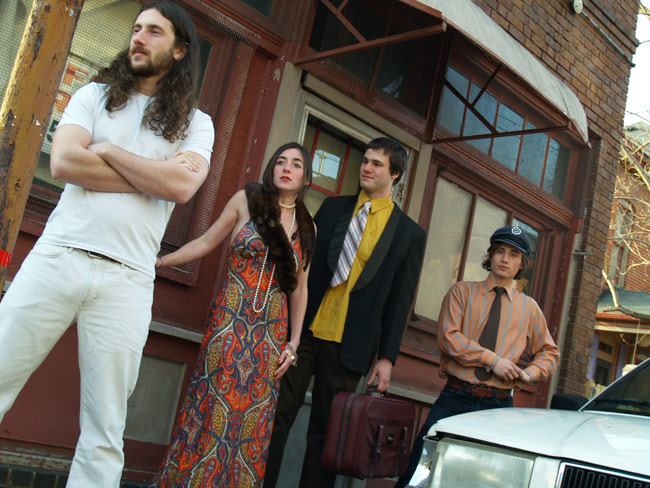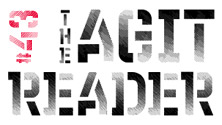
The Future Is in Folklore
by Kevin Elliott
When RTFO Bandwagon first made their way onto the Columbus stage, the reactions were mixed. No one knew exactly what to make of the eccentric duo of Jen Boyce and Andrew Graham as they scruffily rambled through oddly charming pop with only two voices, melodica, a kick drum, and an acoustic guitar. Was it dorm-room performance art or dive-bar busking capable of making a few hearts melt in the process. As the band evolved, and its membership grew (adding an occasional drummer, a bass player, and a full-time tambourine man) things seemed to get increasingly awkward. Even with their debut, Flagships, gaining accolades for its Americana-injected spartan folk-jams, it took some time for the band to sprout live legs. Still you could always see the wheels spinning in the head of Graham, the humble, soft-spoken architect of this noble experiment.
Dums Will Survive is the difficult second record, only now it feels like RTFO have found an identity, and the songs, no matter how concept heavy or achingly quirky, unravel as if written by an accomplished troubadour. In adding to the overall ennui of such a anomaly, especially in a punk and noise dominated Columbus music scene, Graham approached seasoned musicians Dane Terry and Larry Marotta to join in on the sessions, giving “Like a Dan Scherer Over Troubled Water” the worn-in textures and professional sheen of a Grand Ol’ Opry staple. Meanwhile Graham still plays an adroit and patient puck, adapting the wonderfully unstable “Skipper Bunker” from a skipping T. Rex record, “The Soft Approach” from a Greek traditional, and two versions of the title track from the shuffling folk-punk that begat the group. As you’ll learn from my recent interview with Graham, there is some deep meaning in each of these songs—a gravitas gained from slow-cooking each work with the utmost care and precision. Luckily, as “polished” or “profound” RTFO comes across on their sophomore triumph, they still are able to retain the scrappy charms that led them to this point.
I recently caught up with Graham before a show in Fargo, on a lengthy tour that’s had them criss-crossing the country, sometimes within just a few days.
I suppose the first thing I want to know is how you’ve shifted musically from Flagships to Dums Will Survive. Do you feel at this point you’ve found your identity musically, and if so what is it?
Andrew Graham: The shift that you see comes from the fact that I don’t really listen to a lot of music. I mostly just make music. I do get feedback from people that tell me that a particular song sounds like something else, I’ll go and check that out, but usually I’ll get upset that that is what they got out of it. So in a way it’s not so much steering a different course but trying to re-invent softly the same project, hone in on the same idea. With Flagships it was pretty saccharine indie-pop that people compared it to. This one I wanted to make harsher, so that people would pay attention to more aspects than just the melody.
Your process for writing songs sounds somewhat personal, perhaps isolated, with yourself piecing together guitar parts and vocals to get the basic framework, a very folk-centric approach. How do you determine how everyone else in the band will participate? When you’re writing do you envision a part for everyone?
AG: Over the years, I’ve settled into an understanding of not exactly what each person should be playing on a song, but the types of things that other people will contribute to a song. Most times I haven’t given much direction at all about how something should be played. Bands should be a band because they work, and if something doesn’t work, or someone doesn’t seem to mesh into the band, and someone needs to be told how to play, then maybe they should be playing with someone else.
The addition of extra players on Dums, Dane Terry and Larry Marotta, certainly adds a new dimension to the band. I’m not sure if I would call it hi-fi or professional, because I still hear some rough stuff, but there is a grander tone to Dums that was missing from Flagships and the live shows I’ve seen. How did these collaborations come about? Was it something you planned from the very beginning?
AG: Originally I wanted it to be played by an even bigger band. I wanted nine players on every song, and I didn’t know if I could’ve completely justified that. It was something that sounded much better on paper. I do remember writing parts for nine people, playing softer timbres working concert together to make dissonant sounds that had softer textures. I wanted some oft-kilter tonality with softer textures. A lot of Dane’s solos fall into that category. At the same time they are harsher texturally than I planned. We started with a plan to overdo it at first and there were a lot of attempted performances that didn’t make the record, but I think that gives the final recording a variety.
I know you don’t like to refer to it as a concept, but at least the intent of the title track is based in the idea that (in your words) “the elitist left-wing conception that rural America is less intelligent and less evolved than their urban counterparts.” And that eventually if there was something like another Civil War, they would prevail. What brought about this idea and why did you think it was representative of the music and the band?
AG: Basically I got it from my friend Kevin Fink. We were sitting on his porch one night and he said the phrase “Dums will survive,” and I asked him what that meant and he said he didn’t know. Then I asked him how he spelled it and he said “D-U-M-S,” and I really latched on to it. I just thought that phrase itself was provocative. I took some time to develop what that phrase meant and what I would take from that, and it didn’t take to long for that to become the theme of the record.
So you came up with the idea, it wasn’t something that was culled from an existing theory?
AG: It really all came from him spelling it. It indicates that there’s something, but it’s not something in the way that you’re talking about it. It’s not something old, not something from folklore. It’s a new thing, and it’s a new word, and it’s without a whole load of connotations. I had to define it for myself. Right at the time we were getting this all together there was an artist at the gallery I worked at, and right now I’m drawing a blank on his name. But he was doing the same thing where he would make collages of political figures and incorporate newspaper headlines, then take crayon over these pictures to alter them. He was using a lot of misspelled words and his editing on the surface had a really odd critique built into it. That gave me confidence that my concept would come across right.
“Like a Dan Shearer Over Troubled Water” is similarly heavy conceptually, in that it’s about the appropriation of original ideas by the “establishment” and the mainstream. Not that I think the song is unoriginal or a copy of something before it, but it is very traditional in its instrumentation and structure—its feel. Was this juxtaposition intentional?
AG: I don’t feel like I’m at all an actor within the drama that I’m describing in the song. I have never felt like as an artist anyone was ripping me off. I honestly can’t remember how the idea developed. I just wanted to write a song about that. The way I’ve been trying to think about that issue now is to work from the center. On Flagships we were only highlighting things that were on the outside or on the fringe of what we could do. We were a new band and we wanted to establish that we were weird. As you get more confident and you aren’t as worried about how people are going to react, a lot more nuance will develop and you begin to work from a simple template. It gives it a platform where the lyrics have to be about something; they have to have some substance. The lyrics took a long time. I’m writing the music first now, so the words are more meticulously crafted. As a result I’m writing slower and slower now.
One of the qualities about your band that first caught my attention is that you were wildly different from everything else that was sprouting in Columbus. Where did this influence come from you think?
AG: Well, I grew up in a small town and listened to nothing but classic rock, and I still love classic rock. And I wanted to write music that has the good aspects of classic rock without the lengthiness. I wanted to write songs with good chords, good hooks, good melodies, good lyrics that you can understand, recorded relatively well. I wanted to connect musical numbers, or classic numbers. At the beginning it was hard to do that because we had such goofy instrumentation and it was what my friends could do. I just wanted to have a band of friends. Everything happened kind of slowly, but now there’s more method to the initial madness.
I do like, though, as unique as you are to the city’s music scene, you’ve been embraced without a second thought by the lo-fi (shitgaze) circuit, and you’ve even spent some time as a member of Psychedelic Horseshit. If any, did this community have any sway over how you were to record Dums?
AG: Well, when I listen to music at home it tends to be quiet, but when I go out to a show I want to hear loud rock. So it wasn’t really a matter of culture shock because the bands I was going to see in bars played exactly what I wanted to hear. I think that it’s hard to attribute which songs are influenced by what. It’s more of a general thing in that this record would not be like it is without Columbus. I just appreciate that we are in a place that has these cues from other types of music. These are the bands that had energy, not just talking. It didn’t matter what type of music was being played, it was more about getting in the car and getting out and playing shows. I suppose the second version of “Dums Will Survive” on the record, was the song most influenced by this. But then again, it was stripped from the Velvet Underground. I think that most of the good bands in Columbus were influenced by the Velvet Underground, and those were the bands that encouraged me to listen to them more.
